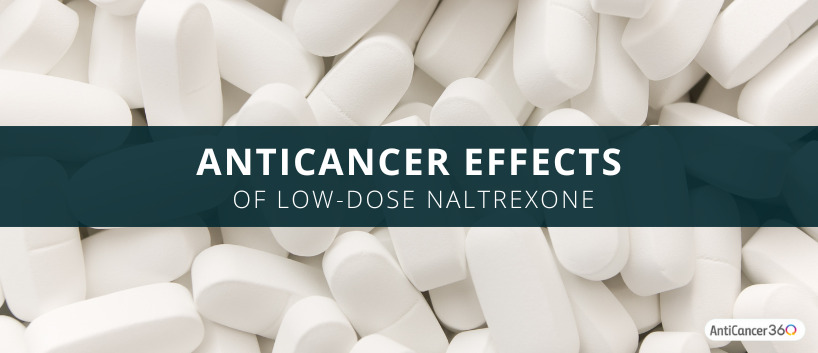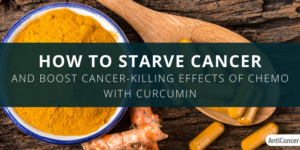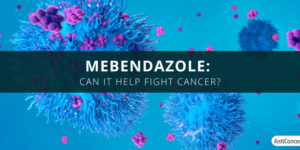While undergoing cancer treatment, many people choose an integrative approach, using natural remedies, lifestyle changes, nutrition, dietary interventions, and recommended oncology treatments. Another approach to supportive care during cancer treatment involves using medications “off-label.” When a medication is used off-label, it means that the Food and Drug Administration hasn’t approved the medication for that particular use; however, existing evidence points to potential benefits.
Off-label use of prescription drugs is a common practice in medicine as well as integrative health practitioners. For instance, other medications used off-label for their possible anticancer effects include mebendazole, ivermectin, doxycycline, aspirin, metformin, and azithromycin. Recently, low-dose naltrexone has been identified as a medication with potential off-label anticancer use.
What is Low-dose Naltrexone?
Naltrexone is a medication FDA-approved for alcohol use disorder and opioid use disorder. However, it may offer a benefit in fighting cancer. While naltrexone is available in higher strengths, only low-dose naltrexone is currently being evaluated for its potential anticancer effect [1].
Naltrexone is an opioid antagonist, meaning it blocks the opioid receptors in your central nervous system cells. It works mainly by blocking the mu-opioid receptor while also blocking kappa and delta receptors to a lesser extent [2].
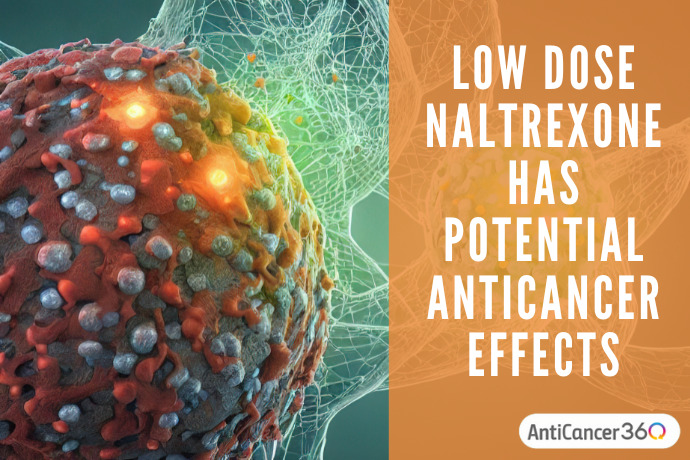
Additionally, naltrexone slows the process of cell growth and replication. In low-doses, naltrexone can interfere with cell signaling and alter the immune system, reducing tumor growth [3].
While low-dose naltrexone displays evidence of potential effectiveness in cancer treatment, higher doses of naltrexone have not displayed the same effects [4].
Potential Anticancer Effects of Low-dose Naltrexone
Naltrexone acts as an opioid growth factor receptor (OGFr) antagonist. The OGFr pathway is present in cancerous cells and is involved in growth, making it a target for anti-cancer treatment [5].
In humans, low-dose naltrexone has shown positive results in people with bladder, breast, liver, lung, lymph node, colon, and rectal cancer [6]. Anecdotal evidence and case reports demonstrate low-dose naltrexone inducing remission in lymphomas, multiple myeloma, neuroblastoma, colorectal, mammary, ovarian, lung, and prostate cancers [7].
A review of several studies and reports of individuals with different cancers treated with low-dose naltrexone reported that five individuals experienced complete or near complete tumor resolution. The same review noted that two people demonstrated reduced lesions or metastases [8]. In another case report, one patient who began low-dose naltrexone after tumor resection showed no evidence of cancer recurrence [9].
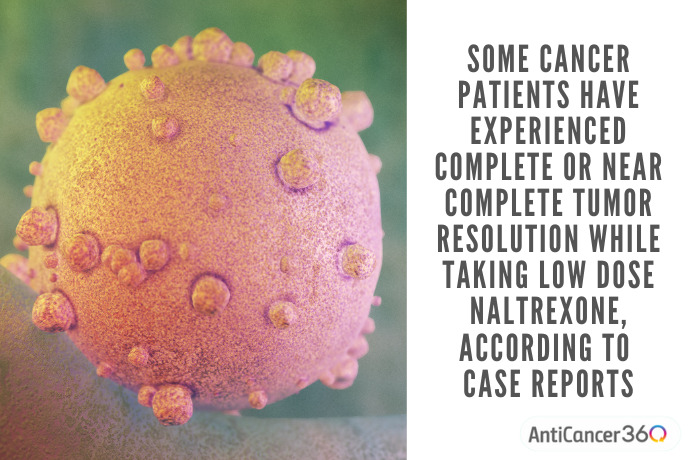
In mice, low-dose naltrexone reduced neuroblastoma tumor incidence by 66%, increased the time required for tumor development and growth by 98%, and prolonged survival by 36% [10]. Further, in a 2020 study assessing its use in colorectal cancer, low-dose naltrexone promoted expression of the OGFr pathway and led to cancer cell death in mice. Low-dose naltrexone also reduced tumor activity in mammary cancer in animals [11].
Interestingly, periodic receptor blocking reduced cancer cell development, while constant blocking of the receptors promoted and enhanced tumor growth [12].
These results are promising, though more studies and data are necessary to definitively prove naltrexone’s role in fighting cancer. Regardless, many people are choosing to augment their anticancer care options by using naltrexone off-label.
Frequently Asked Questions About Low-dose Naltrexone
Can low-dose naltrexone cure cancer?
Unfortunately, it is unclear. There is not enough definitive evidence or studies to say for sure that low-dose naltrexone can cure cancer. It can, however, support your body in fighting cancer by potentially enhancing your immune system [13].
There is no existing scientific evidence assessing low-dose naltrexone’s overall survival impact in humans. But that doesn’t mean it doesn’t affect survival—it just hasn’t been studied yet [14].
However, data shows low-dose naltrexone is beneficial when combined with chemotherapy in cell culture studies. One such study demonstrated that low-dose naltrexone combined with cyclophosphamide or gemcitabine significantly decreased cancer cell count compared to receiving either drug alone in human lung carcinoma cell cultures. However, combining low-dose naltrexone with oxaliplatin did not yield significant results [15].
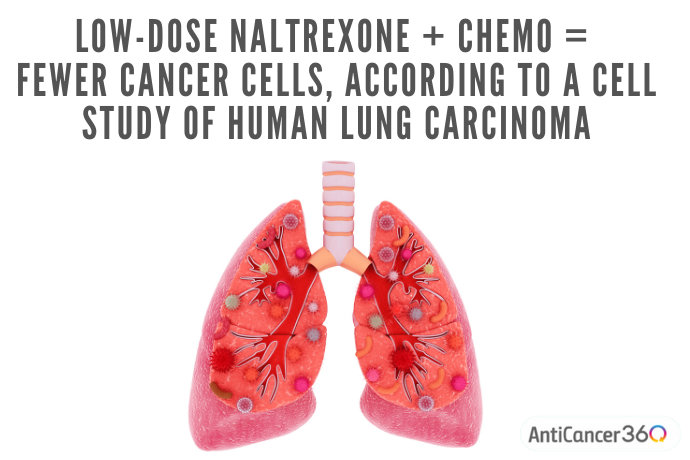
This same study showed that in human colorectal carcinoma cells, low-dose naltrexone significantly decreased cancer cell number when used with cyclophosphamide or oxaliplatin compared to either agent alone. This effect was not seen with gemcitabine. Low-dose naltrexone in ovarian cancer was also assessed, and when used in combination with taxol or cisplatin, significantly decreased cancer cell number compared to cultures treated with chemotherapy alone [16].
What are the side effects of naltrexone?
At or below recommended doses, naltrexone is considered safe and well-tolerated. Some common side effects of standard doses of naltrexone may include (see next FAQ below for more details about naltrexone dosages) [17]:
- Nausea or vomiting
- Headache
- Stomachache
- Abdominal cramps
- Diarrhea or constipation
- Loss of appetite
- Drowsiness
- Anxiety
- Irritability
- Sleep Disturbances
Serious side effects include mental alterations, such as confusion and hallucinations, blurred vision, and severe vomiting or diarrhea. Tell your healthcare provider if you have a history of liver disease or hepatitis, as naltrexone may cause liver damage when taken in large doses.
If you experience a severe side effect while taking naltrexone, speak with a healthcare professional.
What is the dosage of naltrexone for cancer?
Since naltrexone isn’t an FDA-approved cancer treatment, there isn’t an approved or official dose for this purpose.
In general, naltrexone dosing for cancer is much lower than when the drug is prescribed for its FDA-indicated uses. Research analyzing multiple studies of naltrexone’s use in cancer reports “low-dose” naltrexone at 3-5 mg per day [18].
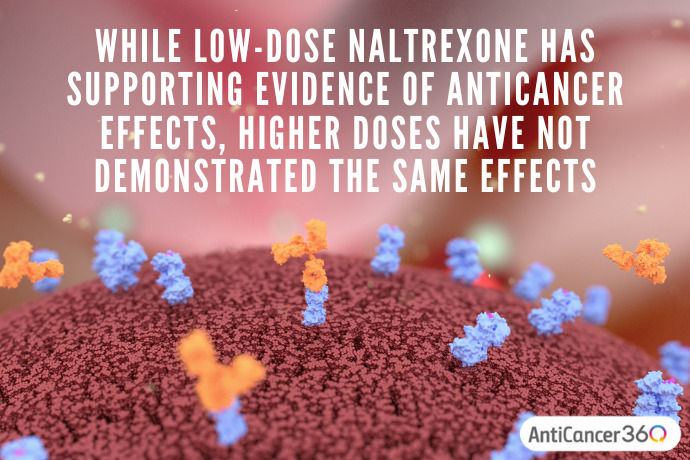
When prescribed for alcohol or opioid use disorder, higher doses of naltrexone are used. For instance, the typical dosing of naltrexone for alcohol use disorder is 50 mg to 100 mg per day [19].
Can low-dose naltrexone help in the fight against cancer?
While it is uncertain that naltrexone can cure cancer and prolong survival, existing evidence suggests that low-dose naltrexone has promising effects in aiding the fight against cancer. By slowing the growth of cancer cells and boosting your immune system, low-dose naltrexone may help your body fight off cancerous cells [20].
Though animal and laboratory studies demonstrate naltrexone can eradicate cancer, studies in humans showing sufficient evidence are needed before naltrexone’s potential efficacy for cancer can be determined [21].
Speak with a trusted healthcare provider if you think starting low-dose naltrexone might be a good option for you.
Medical Disclaimer: The information in this article is meant for educational and informational purposes only. It is not intended to replace a healthcare provider’s medical advice, diagnosis, or treatment. Consult a healthcare practitioner before taking any new medications or supplements.
Ultimately, when using an Aggressive Integrative Approach to cancer, the goal is to fight cancer from every possible direction. This practice includes integrating repurposed medications and natural supplements to fight cancer in an evidence-based, safe way that shouldn’t interfere with your oncology treatment.
How are you approaching your cancer treatment? Are you integrating any natural supplements or strategic dietary approaches? Have you tried low-dose naltrexone or any other off-label medicines for your cancer? Please feel free to share your experience or feedback in the comments below!
Are You A Good Candidate For AntiCancer360?
If you’d like to learn more about the AntiCancer360 approach and see if we can help you, please watch our free online webinar to learn more. At the end, you’ll be able to schedule a free call with our team so that we can discuss your case in detail.
Dr. Patricia Weiser is one of AntiCancer360’s consultant pharmacists, science advisors, and medical writers. Her expertise helps us create safe herbal and supplement combinations and avoid potential drug interactions.
Patricia is a graduate of the University of Pittsburgh and a licensed pharmacist. She has clinical experience in both community and hospital pharmacy. She is passionate about integrative and preventative care and strives to empower her patients to take an active role in their health.

